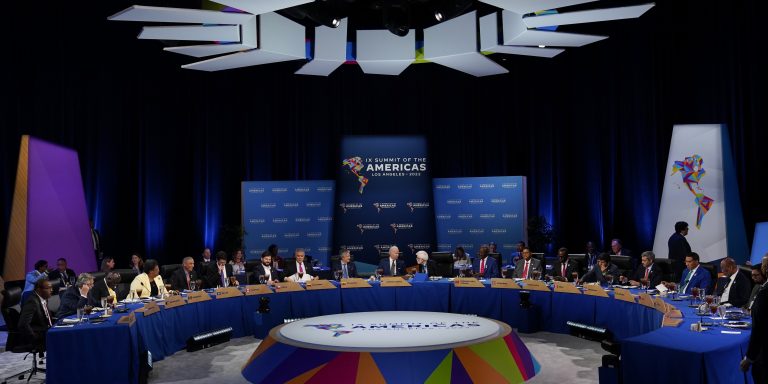INTELBRIEF
June 16, 2022
IntelBrief: One Step Forward and Two Steps Back at the Summit of the Americas

Bottom Line Up Front
- The ninth Summit of the Americas concluded last Friday in Los Angeles, intended to foster international cooperation across the Americas, but this year it also highlighted deep divisions that exist within the hemisphere.
- The decision to leave out the three dictators and the resultant boycotts served as a distraction, drawing attention away from more substantive issues addressed at the summit.
- Along with promises of funding, increases in temporary agricultural worker visas, and refugee resettlements pledges, the Los Angeles Declaration also includes measures to counter human trafficking.
- In an era of great power competition, sidelining non-compliant regimes is not without its dangers—Russia and China both represent alternative strategic partnerships for disaffected leaders within the Americas.
The ninth Summit of the Americas concluded last Friday in Los Angeles. The summit is meant to foster international cooperation across North, South, and Central America, and the Caribbean, but this year it also highlighted deep divisions that exist within the hemisphere. The days leading up to the summit received more media attention than the event itself. Hosting the event for the first time since 1994, the U.S. found itself faced with the unenviable task of having to draft the guestlist. Having already staked out an explicitly anti-autocratic foreign policy, President Biden opted not to invite Cuban President Miguel Diaz-Canel, Nicaraguan President Daniel Ortega, or Venezuelan President Nicolas Maduro. The three have been accused of serious human rights violations and undemocratic practices, such as silencing and arresting domestic opposition figures. The 65-year-old communist government in Cuba was only invited to its first Summit of the Americas when Panama hosted the event in 2015. Ortega and Maduro were both ostracized due to their crackdowns on local opposition and have aligned themselves with the U.S.’s international rivals, such as Iran and Russia.
In response to the Biden administration’s announcement, a number of Latin American leaders, including those of Mexico, Chile, and Argentina, publicly objected to the decision. In the end, the leaders of Mexico, Honduras, Guatemala, Bolivia, and El Salvador chose to boycott the event, sending foreign ministers in their place. Their absence, especially that of Mexican President Andres Manuel Lopez Obrador, was likely felt throughout the summit. The decision to leave out the three dictators and the resultant boycotts served as a distraction, drawing attention away from more substantive issues addressed at the summit. Despite concerns over Brazilian President Jair Bolsonaro’s support for the electoral process in Brazil and the U.S., President Biden decided to meet with him for the first time during the summit. The meeting was expected to be one of the most contentious of the summit, however, the two were gracious to one another during the public portion of their meeting. The controversy leading up to the summit was likely compounded by the fact that Biden had met with autocratic leaders of ASEAN countries last month on a visit to southeast Asia and the now confirmed reports that Biden will meet with the Saudi Crown Prince in July. As a result, many have accused the administration of hypocrisy.
Determined to use the Summit as an opportunity to bolster its Latin America policy and surely to shift the narrative away from the initial controversy, President Biden announced a raft of cooperative aid and development packages as well as a new joint migration declaration. “The Los Angeles Declaration on Migration and Protection” is a region-wide declaration designed to make migration within the Americas safer and better regulated by introducing and improving temporary worker programs. Aftershocks from the pandemic, violence in Central America’s Northern Triangle, and political and economic turmoil in Venezuela and Haiti have combined to cause unprecedented flows of migration across the region. On the last day of the summit, 20 countries signed onto the declaration, which seeks to distribute responsibility for solving the crisis across the region, so as to relieve stress on states like Costa Rica, where migrants from Venezuela now account for up to 10% of the population. Many Latin American countries promised to introduce or increase temporary worker programs, while the U.S.’s contributions are primarily financial. Along with promises of funding, increases in temporary agricultural worker visas, and refugee resettlements pledges, the declaration also includes measures to counter human trafficking. The declaration is a significant step toward addressing the extant migrant crisis and the commitments made by countries across the hemisphere (plus Spain) are highly encouraging.
Despite the controversy, there were tangible benefits to the U.S. hosting the summit. Critics have called President Biden’s Latin America policy lackluster up to this point, so the summit provided an opportunity to address key issues that are often relegated in importance due to competing geopolitical priorities. While one summit is not enough to wholly address these criticisms, it did provide a springboard for progress on pandemic recovery measures and migration issues. However, in an era of renewed strategic competition, publicly sidelining non-compliant regimes is not without its dangers. Russia and China both represent alternative strategic partnerships for marginalized or disaffected leaders within the Americas. Autocratic and non-aligned leaders within the Americas will continue to invoke the threat of an interventionist northern neighbor as they tighten their grips on power and seek new international partners to hedge against U.S. condemnation.